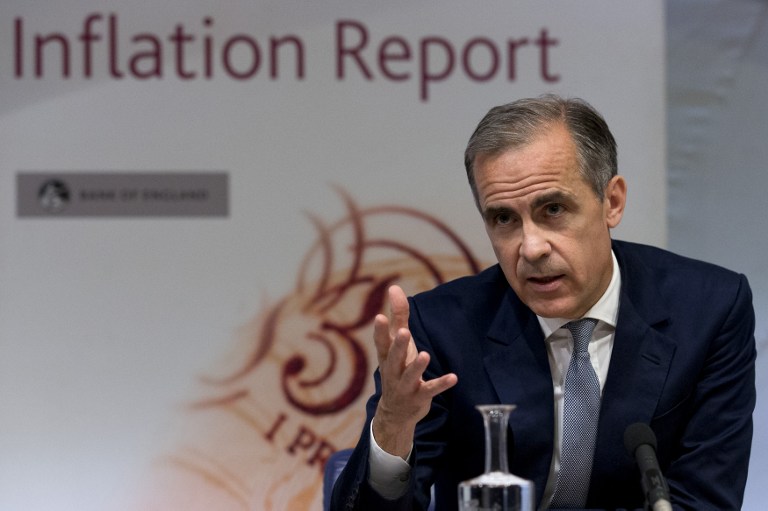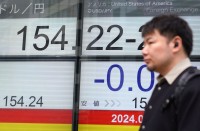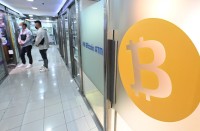
The Bank of England on Thursday cut interest rates to a record low 0.25 percent in a vast stimulus package aimed at preventing recession after Brexit.
/ AFP PHOTO / POOL / JUSTIN TALLIS
LONDON, United Kingdom (AFP) – by Roland JACKSON
The Bank of England on Thursday slashed interest rates to a record low 0.25 percent and announced a vast stimulus package to combat economic fallout from Britain’s looming EU exit.
Policymakers voted unanimously to reduce rates by a quarter-point, the bank said in a statement after its latest meeting, cutting borrowing costs for the first time in more than seven years.
The BoE also delivered a £170-billion ($227-billion, 200-billion-euro) stimulus package, and axed its economic forecasts for 2017 and 2018 in the wake of the nation’s June 23 Brexit referendum.
The bank’s nine-member Monetary Policy Committee (MPC) also agreed to re-activate its quantitative easing (QE) bond-buying scheme, lifting it by £60 billion to £435 billion in the first increase since 2012.
It was the first interest rate reduction since March 2009, when the bank cut to the previous historic low 0.50 percent — and launched the radical QE policy to stimulate lending and growth during the notorious global financial crisis.
‘Unusual’ situation
“It’s an unusual situation, it is a very large identifiable supply shock,” said BoE governor Mark Carney, in reference to the impact of Britain’s looming EU departure on the economy.
“The economic outlook has changed markedly … and (this is) consistent with the risks which the MPC saw before the vote.
“We’re living through a time of considerable uncertainty.”
The BoE will buy £10 billion of corporate debt, while it also unveiled a new scheme worth up to £100 billion to encourage banks to lend to households and businesses. That took the total stimulus to as much as £170 billion.
“At its meeting … the MPC voted for a package of measures designed to provide additional support to growth and to achieve a sustainable return of inflation to the (2.0-percent) target,” the bank said in minutes from the gathering.
Thursday’s news sent London’s FTSE 100 shares index 1.30 percent higher in afternoon deals, while sterling bounced briefly against the euro and dollar before sliding lower.
The BoE meanwhile maintained its 2.0-percent economic growth forecast for 2016.
However, it slashed the growth outlook to 0.8 percent in 2017 and 1.8 percent in 2018. That compared with prior predictions of 2.3 percent for both 2017 and 2018.
“Following the United Kingdom’s vote to leave the European Union, the exchange rate has fallen and the outlook for growth in the short to medium term has weakened markedly,” the bank said.
And it warned: “Recent surveys of business activity, confidence and optimism suggest that the United Kingdom is likely to see little growth in GDP in the second half of this year.”
New British finance minister Philip Hammond welcomed the action, which will seek to counter economic turbulence as Britain seeks to negotiate its departure from the EU bloc.
Support for post-Brexit economy
“The vote to leave the EU has created a period of uncertainty, which will be followed by a period of adjustment as the shape of our new relationship with the EU becomes clear and the economy responds to that,” Hammond said.
“It’s right that monetary policy is used to support the economy through this period of adjustment.
“That’s why I have authorised the governor’s request for an increase in asset purchases and a new lending scheme to support the economy.”
Conservative Prime Minister Theresa May has already signalled that London will not be rushed into EU exit talks — and will most likely will begin the negotiations early next year.
The BoE had flagged last month that it would likely deliver an August interest rate cut in response to Brexit vote on June 23, which had sent markets tumbling and the pound slumping in its aftermath.
British borrowing costs now stand at their lowest level in the central bank’s 322-year history.







